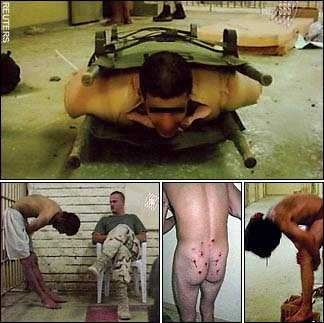Revolution #64, October 8, 2006
The Facts About the Military Commission Act (Torture Law)
As we go to press the “Military Commissions Act of 2006” (MCA) has been been passed by both houses of Congress—and rushed to the White House for Bush to sign into law.
- The MCA legitimizes and legalizes the global CIA program of torture. It bans certain forms of torture, while leaving other techniques unmentioned and legal. Yale Law Professor Jack Balkin points out, ‘‘The MCA continues to recognize that certain conduct is illegal, but attempts to eliminate all judicial remedies for such violations.”
- The MCA rewrites the 1996 War Crimes Act to create a loophole for the torture they have been carrying out. Previously the War Crimes Act made it a felony to commit ‘‘violations” of the Geneva Conventions Common Article 3 (a major international agreement forbidding cruel and degrading treatment of prisoners). After the MCA changes, the War Crimes Act will only forbid ‘‘grave breaches’’ of Common Article 3. And this change is effective retroactively back to 1997. This in effect will allow the Bush administration to violate the Geneva Conventions while asserting its torture methods (like half-drowning prisoners, ‘‘stress positions,’’ and grotesque degradation) are not ‘‘grave breaches.’’ This will protect its CIA torturers from prosecution for war crimes.
- The MCA authorizes a new system of military courts for U.S. captives which the President has labeled “alien unlawful enemy combatants.” After holding and torturing these prisoners, the government can drag them in front of a military commission for a so-called ‘‘trial’’ to be sentenced to execution or more imprisonment.
- In the military commissions, U.S. military officers serve as both judge and jury. Defendants will only be allowed to have lawyers who have government security clearances.
- In the military commission trials, defendants have no right to see all the evidence against them. Statements forced out of defendants or other prisoners by torture can be entered as evidence (if the torture took place before Dec. 30, 2005). Trials can be carried out without the defendants present.
- The MCA authorizes the use of evidence seized without legal warrants both outside the U.S. and within the U.S.
- The MCA forbids prisoners to invoke the Geneva Conventions as a source of rights during military commission trials.
- The MCA rewrites current federal habeas corpus law to forbid federal courts from considering a writ of habeas corpus (a petition for release from unlawful detention) by an “alien” detained as an “enemy combatant.”
- The MCA redefines “unlawful enemy combatant” so that it can be applied to U.S. citizens and to people who have never engaged in combat against the U.S.
- The MCA definition of unlawful enemy combatant is someone who ‘‘has engaged in hostilities or who has purposefully and materially supported hostilities against the United States or its co-belligerents who is not a lawful enemy combatant (including a person who is part of the Taliban, al Qaeda, or associated forces)…” Senator Lindsey Graham said: ‘‘We’re making sure that an enemy combatant could be defined as something other than a front-line troop.”
- The definition of ‘‘unlawful enemy combatant’’ in the MCA is not limited to jihadist forces like Al Qaeda. The MCA can quickly become the legal basis for government roundups of other forces the government chooses to target.
- Yale Law Professor Bruce Ackerman writes that the MCA, “which is racing toward the White House, authorizes the president to seize American citizens as enemy combatants, even if they have never left the United States. And once thrown into military prison, they cannot expect a trial by their peers or any other of the normal protections of the Bill of Rights.” (L.A. Times, Sept. 28, 2006)
- The Center for Constitutional Rights says the MCA could allow the U.S. government to detain the attorneys of prisoners in Guantanamo as “enemy combatants.”
- Under the MCA, legal immigrants in the U.S. labeled ‘‘alien unlawful enemy combatants” can be imprisoned, tortured, denied all legal rights, and sentenced by a military commission. U.S. citizens labelled ‘‘unlawful enemy combatants’’ can be imprisoned and tortured—but the MCA does not make citizens subject to military commissions. The creation of different legal standards for citizens and non-citizens living in the U.S. reverses the long-standing principle that everyone living in the U.S. is governed by the same courts, laws and rights.
- Under the MCA, people can be labeled ‘‘unlawful combatants’’ for supporting hostilities against brutal regimes considered ‘‘co-belligerents”—i.e., U.S. allies in the so-called ‘‘war against terror.’’ Could someone who protested against or exposed the government of Israel, Turkey, or Saudi Arabia disappear into a CIA torture camp? Under the MCA, the definition of “purposefully and materially supported hostilities” is up to Bush to define.
 |
Video captures torture of Abu Ghraib inmates |
If you like this article, subscribe, donate to and sustain Revolution newspaper.



